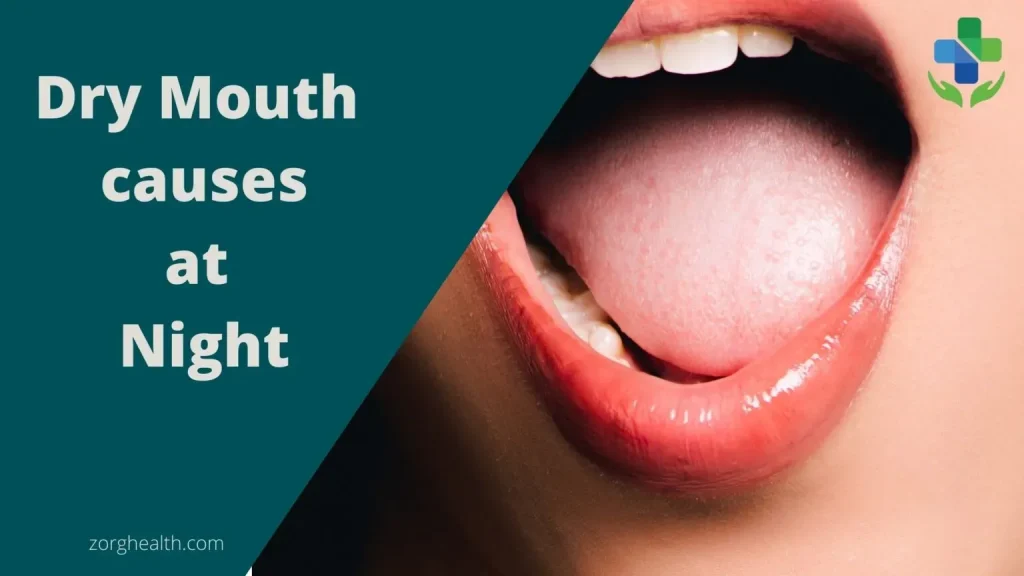Dry mouth at night can be an uncomfortable experience that disrupts restful sleep. For many, this condition is more than just a minor annoyance; it can be a symptom of underlying health issues and can lead to further complications such as tooth decay and gum disease. Understanding the various causes of dry mouth, including hydration levels, medications, and lifestyle factors, is essential in addressing this problem. It’s important to recognize dry mouth symptoms, such as a sticky sensation in the mouth or cracked lips, to seek appropriate dry mouth treatments. By implementing effective strategies for preventing dry mouth at night, you can enhance your oral health and improve your quality of sleep.
Experiencing a parched mouth during sleep can be a common issue, also referred to as nocturnal dry mouth. This condition may stem from several factors that affect mouth hydration, including certain medications, habits like mouth breathing, and age-related changes in salivary function. Individuals may notice symptoms beyond mere dryness, including difficulty speaking and swallowing. Understanding the triggers and adopting proactive oral health tips can help mitigate discomfort and prevent more serious dental issues. Exploring effective solutions such as hydration techniques and appropriate mouth rinses can lead to significant improvements.
Understanding the Causes of Dry Mouth at Night
Dry mouth at night, or nocturnal xerostomia, can have various underlying causes that may vary from person to person. One of the primary reasons is inadequate hydration throughout the day. When the body does not receive enough fluids, saliva production decreases, leading to that uncomfortable dry feeling upon waking. Additionally, certain medications, particularly sedatives or those for depression, can exacerbate this issue by significantly reducing saliva flow.
Moreover, health conditions such as diabetes, HIV/AIDS, and some autoimmune diseases can interfere with saliva production. It’s crucial to discuss these symptoms with your healthcare provider, as they can suggest modifications to medications or treatments that might be contributing to your dry mouth, particularly at night. Importantly, mouth breathing due to nasal congestion or sleep apnea also critically contributes to the dryness experienced during sleep.
Identifying Dry Mouth Symptoms
The symptoms of dry mouth can often be quite uncomfortable and extend beyond just a feeling of thirst. Individuals may experience a sticky sensation in the mouth, making it difficult to swallow, chew, or even speak comfortably. Additional symptoms include cracked lips, a burning sensation in the mouth, and persistent bad breath. Recognizing these symptoms is essential for understanding the need for preventive measures or treatments to alleviate dry mouth.
Chronic dry mouth can have a series of detrimental effects on oral health, including an increased risk of cavities and gum disease. Individuals should be aware of how these symptoms can signal underlying health issues, and by addressing them promptly, they can prevent more serious complications from developing. It’s advisable to maintain an open dialogue with healthcare professionals regarding any persistent symptoms.
Effective Treatments for Dry Mouth
Treating dry mouth effectively begins with identifying the root cause. For instance, if medications are responsible for reduced saliva production, patients can consult their doctors about possible alternatives or dosage adjustments. Increased hydration during the day can also significantly alleviate symptoms of dry mouth at night. Incorporating sugar-free gum or mints can stimulate saliva production, while avoiding caffeine and alcohol will further minimize dry mouth.
For more severe cases, ongoing discussion with dental professionals can lead to the introduction of specialized treatments. These may include the use of alcohol-free mouth rinses or over-the-counter/artificial saliva products specifically designed to combat dry mouth. In some instances, prescription medications like pilocarpine can stimulate saliva production and offer relief to those suffering from chronic dry mouth, especially when linked to other health conditions.
Preventing Dry Mouth at Night
Taking proactive steps to prevent dry mouth at night can significantly enhance overall sleep quality and oral health. Ensuring proper hydration throughout the day is key; aim to drink plenty of water and limit substances that can lead to dehydration, such as alcohol or caffeine. Additionally, using a humidifier while sleeping can introduce moisture into the air, combating the effects of dry air and ensuring a more comfortable night’s sleep.
Mouth breathing, often due to nasal congestion, can exacerbate dry mouth symptoms during sleep. Therefore, addressing nasal issues—whether through medical treatment or using saline nasal sprays—can be pivotal. Furthermore, maintaining good oral hygiene practices will help reduce the risk of complications associated with dry mouth, such as tooth decay or gum disease, which are critical for long-term oral health.
Oral Health Tips for Managing Dry Mouth
Practicing proper oral hygiene is essential for individuals experiencing dry mouth, as reduced saliva creates an environment conducive to bacteria growth. Brushing twice a day and flossing daily, particularly using fluoride toothpaste, helps maintain a healthy ecosystem in the mouth and prevents the onset of cavities. Incorporating an alcohol-free mouthwash can further aid in keeping bacteria at bay, contributing to better breath and overall oral hygiene.
It’s also advisable to regularly schedule dental check-ups, which can help monitor the effects of dry mouth on oral health. Your dentist may suggest additional preventive methods, such as fluoride treatments or sealants, to protect the teeth from potential decay stemming from a lack of saliva. This holistic approach to oral health is crucial for anyone dealing with the challenges posed by dry mouth.
The Impact of Medications on Dry Mouth
Many people are unaware that medications can significantly contribute to dry mouth symptoms. From antihistamines to antidepressants, a wide array of pharmaceutical drugs list dry mouth as a possible side effect. If you experience persistent dry mouth and think it may be related to your medication, discussing this with your healthcare provider is crucial. They could potentially switch your prescription or adjust the dosage to mitigate this side effect.
Additionally, understanding which medications are most likely to cause dry mouth can empower individuals to make informed decisions about their treatment options. In some cases, the trade-off between managing a condition and dealing with the discomfort of dry mouth may warrant exploring alternative therapies or supplementary treatments to relieve symptoms effectively.
Lifestyle Changes to Combat Dry Mouth Symptoms
Incorporating simple lifestyle changes can have a profound impact on managing dry mouth symptoms. For instance, avoiding tobacco and modifying alcohol intake can significantly reduce the occurrence of dry mouth, as both are known to dehydrate the body. Furthermore, opting for a balanced diet rich in vegetables and fruits can enhance overall hydration and assist in saliva production.
Additionally, mindfulness regarding daily fluid intake can make a difference. Carrying a water bottle throughout the day to encourage habitual drinking can help maintain hydration levels. As a preventative measure, making conscious dietary choices and steering clear of excessively salty or sugary foods that could exacerbate dry mouth symptoms is beneficial.
The Connection Between Health Conditions and Dry Mouth
Various health conditions can influence the severity of dry mouth symptoms. Chronic illnesses like diabetes can alter the body’s fluid balance, leading to increased dryness, while autoimmune disorders such as Sjögren’s syndrome directly affect saliva production. Recognizing this connection is vital for individuals experiencing chronic dry mouth, as it underlines the importance of seeking medical advice to promptly address these concerns.
Moreover, systemic diseases like HIV/AIDS can disrupt normal salivary function, making it imperative for patients to communicate any oral discomfort to their healthcare providers. By treating the underlying health issues, patients often find significant improvement in their dry mouth symptoms, contributing to a better quality of life and oral health.
The Role of Hydration in Preventing Dry Mouth
Hydration plays a critical role in preventing dry mouth, especially during the night when the body naturally produces less saliva. Aiming for adequate fluid intake throughout the day ensures that the body maintains optimal hydration levels, thus supporting saliva production. Individuals should aim to drink at least eight glasses of water daily, adjusting for physical activity and climate to meet their needs.
In addition to drinking water, incorporating foods with high water content—such as fruits and vegetables—can also aid in staying hydrated, ultimately reducing the risk of experiencing dry mouth symptoms. Moreover, awareness of how specific beverages can affect hydration is essential; for example, alcoholic drinks and caffeine tend to dehydrate, so limiting these can help preserve moisture in the mouth.
Frequently Asked Questions
What causes dry mouth at night and how can I manage it?
Dry mouth at night can be caused by several factors, including dehydration from not drinking enough water during the day, mouth breathing during sleep, aging, and certain medications. To manage dry mouth, ensure adequate hydration, avoid tobacco and alcohol, and consider using a humidifier while sleeping.
What are the common dry mouth symptoms at night?
Common dry mouth symptoms at night include a sticky feeling in the mouth, difficulty chewing or swallowing, burning sensations, cracked lips, and bad breath. If you experience these symptoms frequently, it’s important to consult with a healthcare professional.
How can I prevent dry mouth at night?
Preventing dry mouth at night involves several strategies: drink plenty of water throughout the day, avoid caffeine and alcohol, breathe through your nose instead of your mouth, and consider using a humidifier. You can also use sugar-free gum to stimulate saliva production.
What treatments are available for dry mouth at night?
Treatments for dry mouth at night depend on the underlying cause. Increasing water intake, using humidifiers, and chewing sugar-free gum can be helpful. If symptoms persist, consult your dentist for options such as artificial saliva or prescription medications specifically designed to alleviate dry mouth.
How does oral health impact dry mouth symptoms at night?
Poor oral health can exacerbate dry mouth symptoms at night by increasing susceptibility to tooth decay and gum disease. Maintaining good oral hygiene, using alcohol-free mouth rinses, and regularly visiting your dentist can improve oral health and help manage dry mouth issues.
Are there specific oral health tips to help with dry mouth at night?
Yes, specific oral health tips to mitigate dry mouth at night include brushing your teeth regularly with fluoride toothpaste, using an alcohol-free mouthwash, staying hydrated, and considering artificial saliva products. These steps can help soothe the dryness and protect your teeth.
Can medications cause dry mouth at night?
Yes, many medications can cause dry mouth at night as a side effect, particularly those used for treating high blood pressure, depression, and allergies. If you suspect your medications are contributing to dry mouth, consult your healthcare provider for possible alternatives.
How does sleep apnea relate to dry mouth at night?
Sleep apnea can lead to dry mouth at night due to mouth breathing during sleep. If you suspect sleep apnea is a factor, seek medical advice for diagnosis and treatment options, which may help alleviate dry mouth symptoms.
Is dry mouth at night a serious condition?
While occasional dry mouth at night is common and often harmless, persistent dry mouth can indicate underlying health issues and may lead to complications such as dental problems or infections. If symptoms are chronic, it’s advisable to consult a healthcare professional.
| Key Point | Details |
|---|---|
| Causes of Dry Mouth at Night | Caused by dehydration, medications, aging, smoking, mouth breathing, and certain health conditions. |
| Symptoms of Dry Mouth | Cotton-mouth feeling, stickiness, difficulty chewing/swallowing, burning sensation, dry lips, bad breath. |
| Treatment Options | Increase water intake, chew sugar-free gum, avoid tobacco/caffeine, use humidifiers, consider oral rinses, discuss with dentists regarding treatments such as artificial saliva. |
Summary
Dry mouth at night can be an uncomfortable condition that affects many individuals. It often results from inadequate saliva production caused by various factors, including dehydration and certain medications. This condition not only leads to discomfort but can also contribute to more serious dental issues if not addressed. Therefore, understanding its causes, symptoms, and effective treatments is crucial for maintaining oral health and comfort during sleep.



